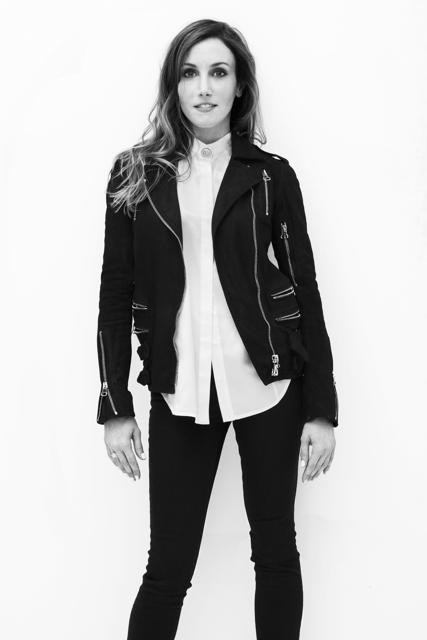- Letters from home: Though N.C. only gets a brief mention in her new novel, Night Film, Marisha Pessl says she grew up in Asheville reading a lot of Southern writers. “It would be interesting to write a book set in the South,” she says. Maybe that’s a hint of what’s next. Photo by David Schulze
“In some ways I feel like I’m a translator, not a writer,” says Marisha Pessl. The Asheville-raised, New York-based author managed to “translate” two Moleskine notebooks full of thoughts, ideas and photos into the darkly suspenseful, wonderfully addictive new novel, Night Film.
Clocking in at just under 600 pages, the dreamy (sometimes nightmarish), thriller winds through netherworlds and various realities. It takes off at a brisk pace — with investigative journalist Scott McGrath on a drunken and ill-advised late-night jog around Central Park’s Reservoir — and accelerates from there.
But Scott, the middle-aged and slightly loser-y narrator of the story, is not the first character who came to Pessl. “I had started building the backstory of Cordova and this idea of a filmmaker who lives outside of society and creates an underground culture around him,” she says. Though reclusive film director Stanislas Cordova barely appears (and even then, is it really him?) in Night Film, his presence infiltrates every page of the novel just as it did Pessl’s psyche. So much so that she actually quoted the fictitious Cordova in a 2009 Visiting Writers Series presentation at Lenoir-Rhyne University. “It made sense, because I’d gotten to know him, for me to introduce him in the lecture,” she says. “But I knew it was a little bit impish of me to do.”
Pessl is an author who really lives with her characters and with her research. Though she says that she didn’t know, at the outset, every single twist and turn of Night Film, that it wasn’t outlined as specifically as her heady, convoluted debut, Special Topics in Calamity Physics, she did go where her characters went. The story centers around Cordova’s troubled daughter, Ashley, whose death at the novel’s start drives Scott to solve the mystery. The journalist and his unlikely allies, Nora (who just landed in New York with an ancient parakeet and a wardrobe inherited from a senior citizen cross-dresser) and Hopper (a charming drug dealer) follow strange leads down proverbial rabbit holes. “I went to Chinatown late at night and was followed by an unmarked van,” says Pessl. “I left my desk so I could know what it felt like to be dislocated and to be in a place that was dark and foreign, and completely out of my element. I wanted to make that real to myself.”
The writing process itself was daunting, the author admits: “There were definitely times when I thought I had bitten off much more than I could chew.” The thing is, Night Film goes a lot further than into New York’s abandoned buildings and darkened alleys. It touches on cult of personality and the occult; on the power of fear and the slipperiness of perception. “When you finally returned to your real life after working with Cordova, it was as if all the colors had been turned up in your eyes,” a former actress tells Scott at one point. “I accessed the deepest, most tormented parts of myself, parts I was petrified of opening because because I doubted I’d ever get them closed again.”
To add to the mystery, as well as the off-kilter-ness that roils just below the novel’s surface, Pessl teamed up with London-based design firm Kennedy Monk to create collections of photos, newspaper clippings, magazine articles and webpages from a secret Cordova fan site. “I was always thinking in terms of this secret archive that the characters start assembling,” the author says. The very realistic and stylistically-spooky addenda appear at points throughout the book, offering a break from the text.
Pessl says she loves “tactile investigation” and wanted to include that element because “Cordova is a visual artist, as a filmmaker, so part of his appeal is visual. I wanted to give just a bit of life to that so it could take root in the reader’s imagination.”
But, even as those multimedia clues allow the reader to play along, tracking down the elusive Cordova and his doomed daughter, don’t be fooled. Every time the story seems to have reached a conclusion, another twist is revealed.
Here’s a real-life twist: In April, The Hollywood Reporter announced that Chernin Entertainment and Rupert Wyatt (Rise of the Planet of the Apes) would adapt Night Film for the big screen. Night Film is steeped in motion picture lore (though Pessl points out, “It’s really a book about the stories we tell”). Pessl, who studied film and theater in college, has written screen plays. But when asked if she’d take on the role of screenwriter for Night Film the movie, she says no: “They can take my blueprints and do something entirely different.”
She adds, “I’m not precious about my work. Once I write a novel, creatively, I’m not interested any longer. I’d rather go on to my next story.”
— Alli Marshall can be reached at amarshall@mountainx.com.
who: Marisha Pessl reading and book signing
where: Malaprop’s
when: Thursday, Aug. 22 (7 p.m., free. http://malaprops.com)







Before you comment
The comments section is here to provide a platform for civil dialogue on the issues we face together as a local community. Xpress is committed to offering this platform for all voices, but when the tone of the discussion gets nasty or strays off topic, we believe many people choose not to participate. Xpress editors are determined to moderate comments to ensure a constructive interchange is maintained. All comments judged not to be in keeping with the spirit of civil discourse will be removed and repeat violators will be banned. See here for our terms of service. Thank you for being part of this effort to promote respectful discussion.